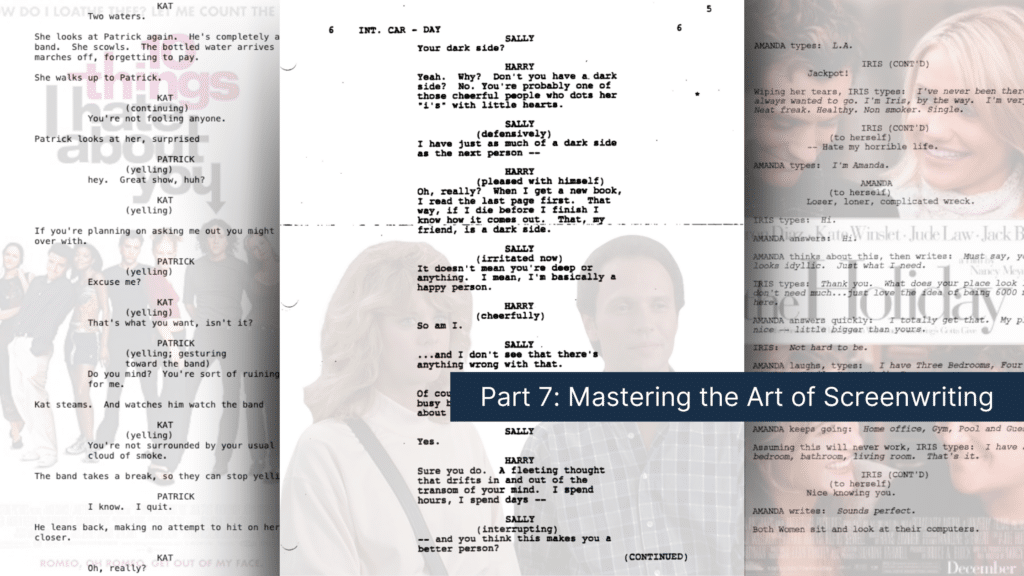
This is part 7 of our Screenwriting Series: Write a Script in Every Genre.
Love is in the air here at Celtx as we introduce the next part in our Screenwriting series. Today it’s all about how to write a romantic comedy or ‘rom com,’ a long-time staple of film and television that has captivated audiences with its blend of humor and heart.
Whether you’re a writer with a cupid-ly brilliant idea or a fan wanting to dive into the magic behind these feel-good stories, then you’ve certainly come to the right place! In this blog, we’ll walk you through the essentials of crafting a rom com screenplay that’ll make audiences laugh – and maybe cry!
Fancy diving further into the history of rom coms? Check out this awesome Glamour magazine article for all the gossip!

What Makes a Great Rom-Com?
A romantic comedy is, at its core, the perfect balance of comedy and romance. Though these are two contrasting genres, when done well, together they create both a heartwarming and hilarious viewing experience.
There are multiple ingredients to concocting a funny yet heartening rom-com. While it’s important for us to experiment as screenwriters, by ensuring that these elements are present in our rom com scripts, the audience will easily recognize the genre.
A Perfect Blend of Comedy and Romance
In a romantic comedy, the comedy often derives from the characters’ quirks, misunderstandings, and the awkward situations they find themselves in. The romance comes from the development of the relationship between the two main characters.
A great rom com weaves comedy and romance seamlessly, with moment of tension and release, laughter, and a warm connection with the audience.
The key to striking the right balance is ensuring the comedy never undermines the romantic plot. While the characters may engage in comical situations or dialogue, these moments should bring them closer and add emotional depth to their journey. Remember, the humor in rom-coms isn’t just for laughs but is an essential part of the romance.
TIP: Whether your story follows the traditional “happily ever after” or embraces modern ambiguity, understanding the genre’s evolution is essential. For a deep dive into how core rom-com tropes have changed, read our full analysis of Classic vs Contemporary Romantic Comedy structure
It’s a match!
Celtx + your rom-com script = happily ever after.
Try Celtx for free today!
Core Tropes
As with all genres, romantic comedies have their own set of signature tropes. When done right, they can be made to feel fresh and satisfying to view. Here are a few of those tropes that are just dying to be adapted.
The Meet-Cute
Also known as the ‘memorable meeting,’ the meet-cute is a quirky and sometimes serendipitous moment when two characters cross paths for the very first time. This moment could be as simple as bumping into each other on the street or one accidentally spilling coffee over the other.
Here is where we see the initial spark between the characters and the first hints at the potential for romance.
Take this early scene from When Harry Met Sally (1989). Here we see Harry and Sally meet during a car ride from Chicago to New York, a meeting that is the furthest from romantic you could possibly get. Take a look at the clip:
It’s clear that Harry’s skeptical and condescending nature and Sally’s opinionated one completely clash to start with, however it’s the spark of awkward charm between them that we the audience realize the potential for romance which later blossoms.
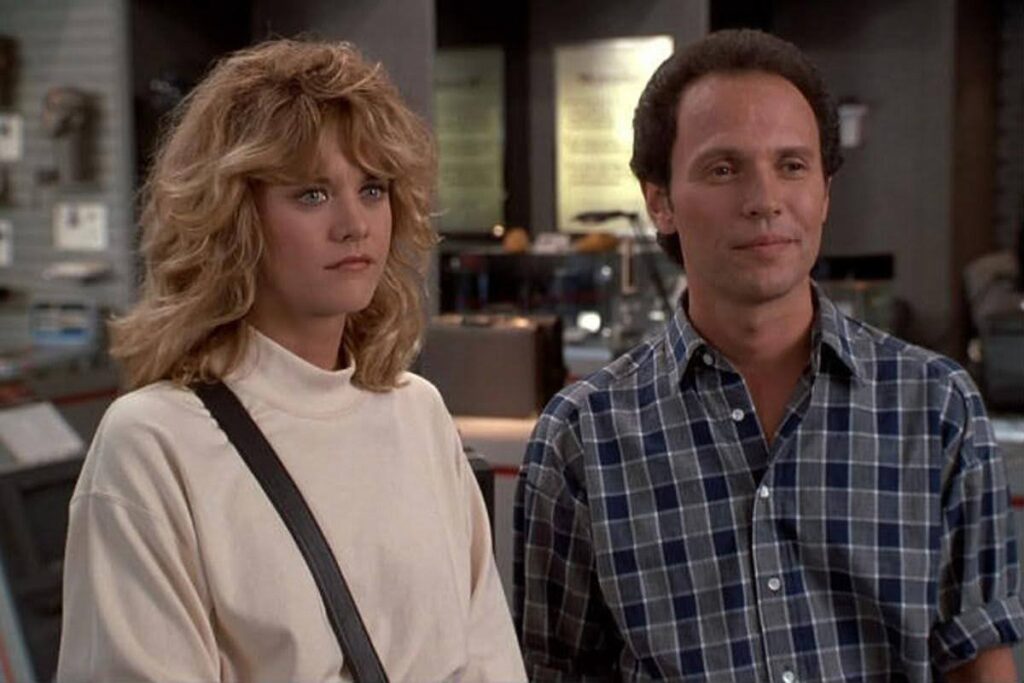
We’ll have what she’s having: Celtx
Click here to start your free trial!
Opposites Attract
A firm favorite in rom coms, opposites attract is the idea that two people who are vastly different from one another, either in personality, background, or lifestyle, inevitably fall for each other.
The characters could start off as enemies or rivals, soon discovering that their differences actually complement each other in the most unexpected of ways.
The Proposal (2009) is the perfect example of opposites attract with no-nonsense publishing executive Margaret slowly falling for her easy going and slightly nerdy assistant, Andrew. These are classic opposites with their contrasting personalities leading to both comedic conflict and romantic chemistry which ultimately proves they’re perfect for one another.
In this clip we see Margaret’s cutthroat business manner, with Andrew’s more chilled out almost awkward approach as employee Bob is told he’s fired.

Miscommunication
Miscommunication is another classic trope in rom com. This tends to fuel most of the tension as characters often misunderstand each other’s intentions or don’t express their feelings clearly.
This trope often leads to comical but emotionally charged moments ranging from a simple case of mistaken identity to more complex misunderstandings that drive the plot forward.
In You’ve Got Mail (1998), the entire romantic arc hingers on miscommunication. Through Kathleen and Joe developing an anonymous relationship via email, they share the most personal of thoughts and details without knowing the other is a direct enemy of the other. Joe is a corporate rival to Kathleen’s small bookstore.
This single missed detail is the unravelling of the entire plot once its revealed, with the audience aware of it the entire time, creating tension and comedic moments aplenty.
In this clip we see Kathleen and Joe discuss what could have been following the fall out of finding out who each other really are.
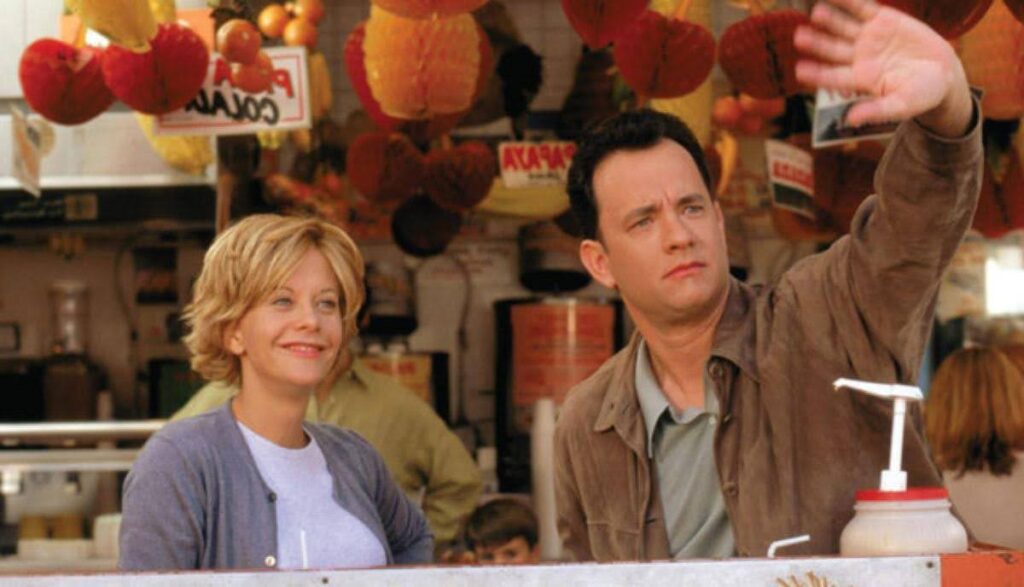
Developing Chemistry Between Characters
The connection between the love interest is at the heart of the story. Without it, the audience won’t believe in the romance.
Now we’ve met a few of rom com’s most beloved characters, let’s explore how we can write our own, ensuring their relationships are believable and their chemistry is electric.
Writing Believable Relationships
To make the relationship between the leads believable, their interactions need to feel grounded in real emotion. The best rom-coms take time to build the relationship, showing how the characters grow together through their comedic and emotional struggles.
In Legally Blonde, the relationship between Elle and Warner evolves slowly. While Elle starts out trying to win Warner back, her personal growth and pursuit of her own goals turns out to redefine their relationship, showcasing a love story built on mutual respect and individual growth.
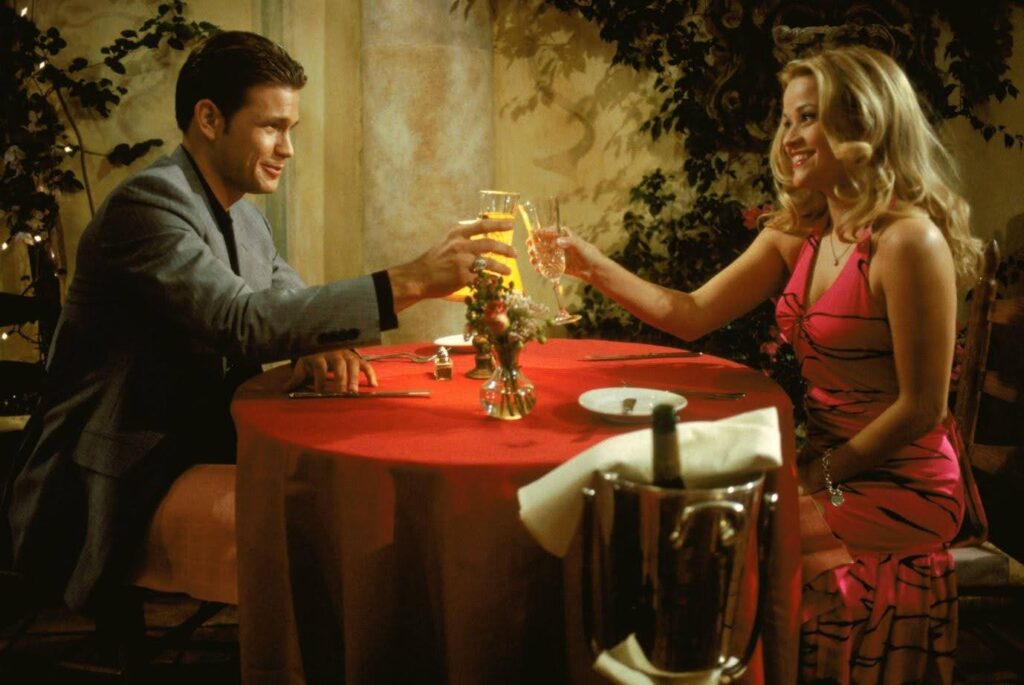
For another great example we’ll return to When Harry Met Sally. The evolution of the leads’ relationship is subtle but profound. What starts out as a casual friendship filled with debate and banter, eventually turns into something much deeper.
The characters’ different perspectives fuel their interactions, but it’s their shared vulnerabilities and growing affection that eventually secure the bond between them.
When your script needs chemistry, Celtx is the perfect formula.
Try it for free today!
Conflict Must be Earned
It’s important to remember that the conflict in a rom com should stem from the characters’ personalities, goals or misunderstandings.
Conflict should also challenge their relationship but also provide opportunities for growth, leading to an overall satisfying resolution.
Let’s take Bridget Jones’ Diary where Bridget faces internal and external conflict arising from her insecurities and romantic entanglements. It’s these feelings of self-doubt layered with constant miscommunication that lands her in comedic situations with Mark Darcy and Daniel Cleaver. This is demonstrated in the scene where Bridget discovers Daniel has been cheating on her following an embarrassing ordeal at a family party.
As Bridget begins learning to embrace her imperfections, she begins to trust in herself and her decisions, ending the movie in the arms of Mark Darcy. Her eventual choice is satisfying to us as an audience as it resolves her inner conflict of self-acceptance, rather than Mark just winning the rivalry contest.
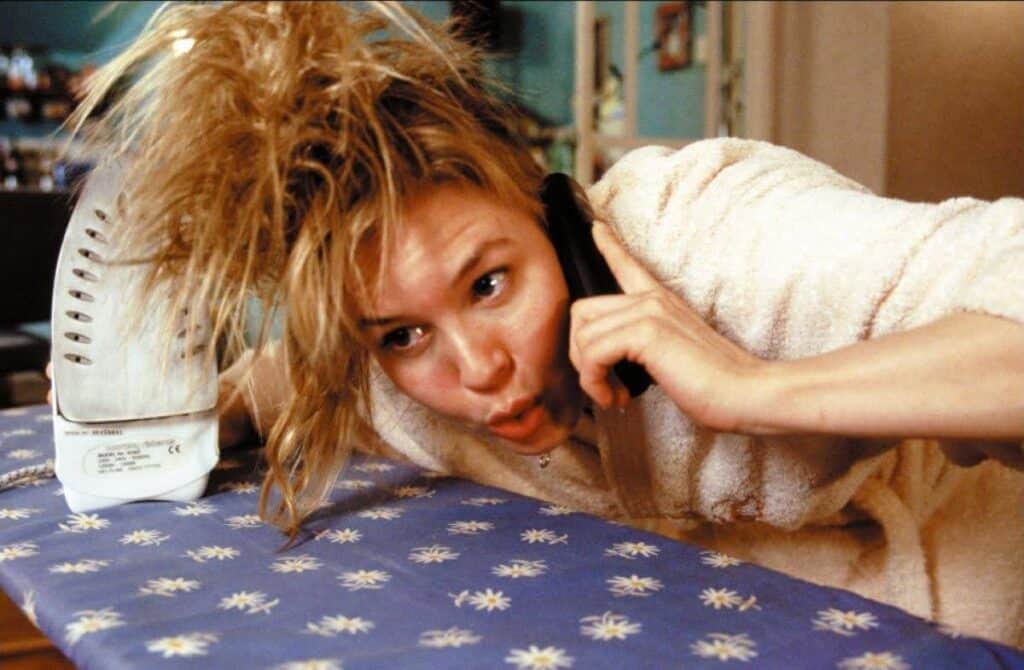
Comedic Timing and Writing Romantic Humor
Once we’ve crafted characters that resonate with our audience, it’s time to master the art of comedy timing. Both comedy and romance rely on this, so we need to consider how long we let a joke sit for, when to deliver a punchline, and when to hold back.
In rom coms, this timing is even more important as we’re balancing humor with sincerity. Comedy in a rom com is often at its best when it highlights a character’s vulnerabilities or awkwardness. This shows their humanity and so much serve the larger emotional arc of the script.
If a scene is too comedic, it could undermine the emotional weight of the romance, while one that is too serious could feel tonally wrong.
Timing might be everything, but there’s no bad time to start using Celtx.
Start your free trial today!
The writing in 10 Things I Hate About You expertly balances humor with sincerity. Kat and Patrick’s sharp, witty banter creates tension but also reveals their insecurities and growing feelings for one another.
The humor makes the romance light and playful while the emotional moments remind us that these characters are more than just funny one-liners and are developing a deep connection. Even from their first meeting shown in the clip below, we see their quick-fire exchange, the subtext of their words revealing their characters.
As you can see, much of the chemistry between Kat and Patrick comes from their back-and-forth exchanges. They challenge and tease each other while showing glimpses of vulnerability that make us root for them.
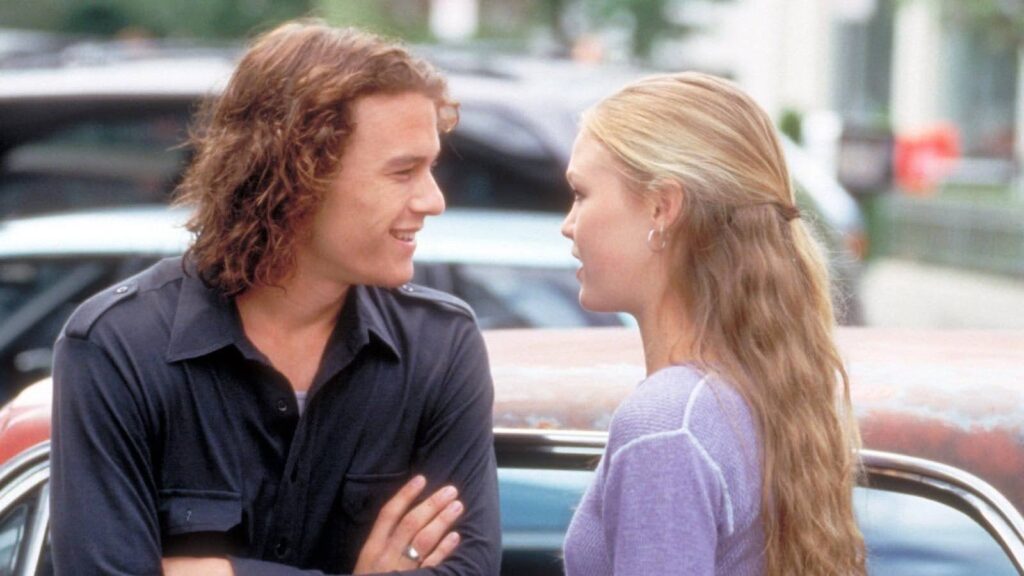
Writing Love Scenes Without the Cringe
How many times have you watched a movie and thought it was ‘totally cringe’? Well, one of the trickiest aspects of writing a rom com is making the romantic moments meaningful without veering into cheesy territory.
Love scenes should feel authentic and not forced and should serve the emotional development of the characters rather than just fulfilling a narrative need. Remember, characters are at the center of our stories.
To make romantic moments meaningful, consider how each character expresses love. It could be through a quiet gesture, a heartfelt confession, or a shared moment of vulnerability. Avoid falling into the cliched trap of over-the-top gestures unless it fits the tone of your story.
Take Crazy Rich Asians. The grand gesture at the end of the film feels earned due to the emotional build up throughout the movie.
It’s not just about Nick impressing Rachel, but about showing vulnerability, sacrifice, and personal growth. While the final scene is a visual spectacle for the audience, it also rounds off the couple’s highly emotional journey.
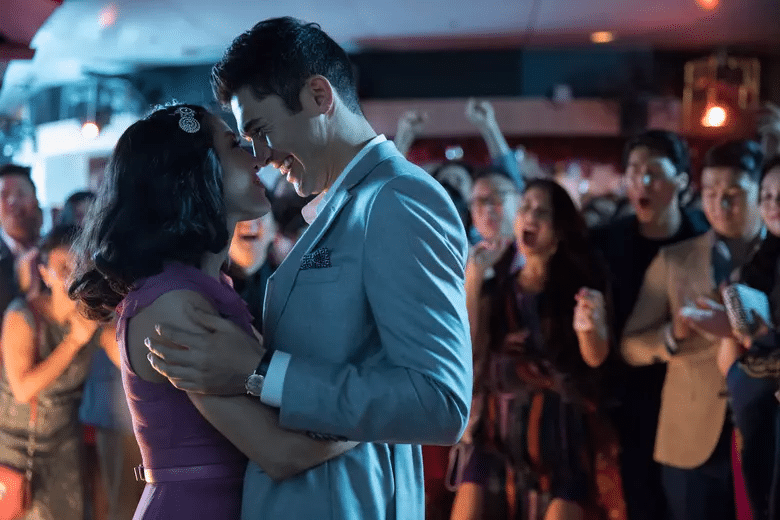
Similarly, in The Holiday, Iris and Miles’ relationship builds organically. When Miles confesses his feelings for Iris, he doesn’t rely on grand gestures but on genuine emotion. He never outrightly says ‘I love you’ but we see the emotion in their actions and through their growing friendship.
As we can see from the scene, Miles isn’t trying to ‘win’ Iris but simply express his feelings, with Iris’ response a genuine one. She initially hesitates but realizes the connection they have is real and meaningful. Their reactions say it all!
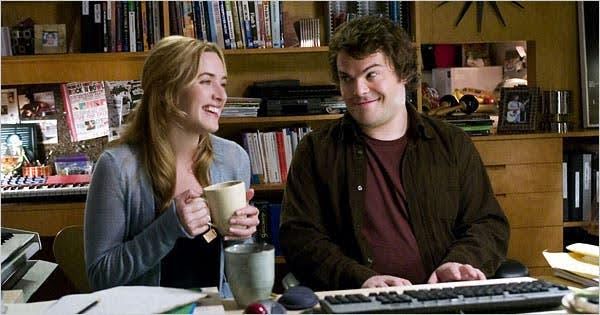
It just goes to show we don’t need to rely on extravagant gestures or dramatic declarations to make a lasting impact on our audiences.
Crafting Your Rom-Com Script with Celtx
Writing your own rom com script requires not only creativity but organization! Here is where Celtx comes in.
Our beat sheet tool is great for structuring your story, helping you map out key moments and emotional beats from the meet-cute to the final reconciliation. Celtx allows you to create detailed outlines, ensuring your story flows smoothly.
Our automatic formatting and timeline management help you to ensure your script’s tone, timing and pace stay consistent.
Why not check it out for yourself?
FAQs
Rom-coms balance emotional stakes with humor. The relationship drives the plot, but the tone stays light, charming, and rooted in comedic conflict or misunderstanding.
Not necessarily—but a memorable first encounter helps establish chemistry fast. Whether adorable, awkward, or chaotic, the meet-cute sets the tone for the relationship.
Start with authentic characters who want something beyond just “finding love.” Ground the humor in emotional truth, and put a fresh spin on familiar tropes rather than relying on them outright.
Most rom-com features land between 90–110 pages. Keeping the story tight and pacey helps maintain both comedic timing and romantic momentum.
A joyful or hopeful ending is standard, but not mandatory. What matters is emotional satisfaction—whether the couple ends up together, reconnects later, or makes a meaningful choice that reflects the theme.
Conclusion
Crafting a rom-com script is all about striking the perfect balance between humor and heart. By embracing key tropes like the meet-cute, opposites attract, and miscommunication, you can create engaging characters and moments that resonate with your audience.
Developing chemistry between your leads, mastering comedy timing, and writing love scenes that feel genuine are all vital to making your romantic comedy both entertaining and emotionally satisfying.
<< Go Back — From Tears to Triumphs: How to Write a Drama Script
Go Forward — Crafting Holiday Magic: How to Write a Christmas/Holiday Script >>
Focus on your story, not your formatting.
Let Celtx’s Script Editor automatically apply all industry rules while you focus on the story.
Explore the Full Series:
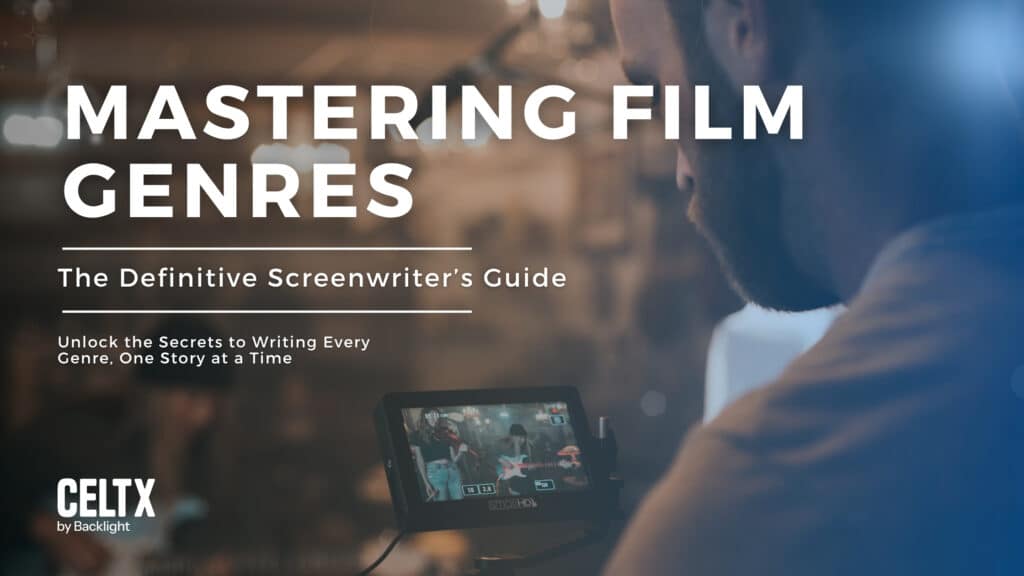
Mastering Film Genres: The Definitive Screenwriter’s Guide
Explore the bigger picture of genre writing—from structure to tone to audience expectations—and see how every genre connects back to the fundamentals of great storytelling.
